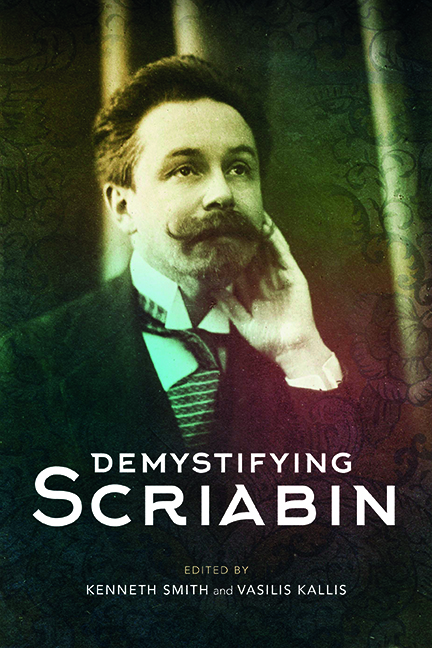3 - Scriabin as a Writer: The Development of Scriabin’sThought as Shown in a Lifetime’s Writings
Published online by Cambridge University Press: 07 October 2022
Summary
‘These ideas are my plan, and they enter into thework just as the sounds do’.
Complementary Narratives: The Composer's Need forVerbal Expression
There are composers who conceal or encode extra-musicalthoughts or stories which may have given rise totheir music, an example being Rakhmaninov. Wagner,on the other hand, explains everything. Some ofScriabin's works have explicit internal orpsychological ‘programmes’, but behind all of hismusic is a current of thought which increasinglyshapes and informs it. While he liked to discussthis thought with friends, his writings on thesubject were for his own private use. Scriabin'snotebooks were kept hidden, though they seem to havebeen shown to the composer's partner, Tatiana deSchloezer (Shlëtser). This fundamental factconcerning Scriabin's writings is essential to anunderstanding of how they should be read: threadsare dropped and taken up again; a linear structureor narrative is not to be assumed.
Scriabin's writings start in adolescence and continueuntil his untimely death. A substantial selectionreached posterity through a publication whichappeared after the 1917 revolution. This selection,the main source for us of Scriabin's writings, wasprepared by three people profoundly in sympathy withScriabin. Scriabin's life-partner Tatiana deSchloezer was concerned that the notebooks bepublished, to explain his worldview and itsevolution to a wider public. Her brother, Boris deSchloezer, who assisted her in choosing thematerials and wrote a long introduction to thepublication, was a close friend of Scriabin andpublished the first volume of a monograph focusingon the composer's thinking. The editor of Russkie propilei, MikhailGershenzon, had edited the anthology Vekhi (Landmarks) (1909),stating his aim as ‘the recognition of the […]primacy of the spiritual life over the outward formsof society’. In an article of 1910, Gershenzon wroteof his belief in ‘cosmic unity’, a belief whichharmonises closely with Scriabin's worldview.
Scriabin's writings are of two kinds: texts for orassociated with certain works such as the FirstSymphony, the Fourth Sonata, or the Poem of Ecstasy; and generalphilosophical reflections. The latter constitute anincreasingly exact counterpart of his music, to theextent that Boris de Schloezer suggested that it wasneither a case of the text inspiring the music northe music inspiring the text. Instead, both pointedto an original vision, a ‘gift of insight’.
- Type
- Chapter
- Information
- Demystifying Scriabin , pp. 46 - 63Publisher: Boydell & BrewerPrint publication year: 2022



